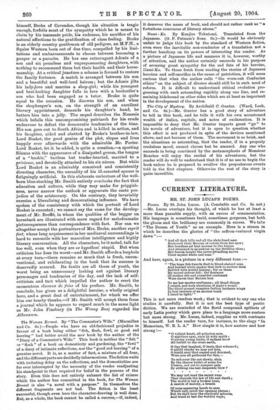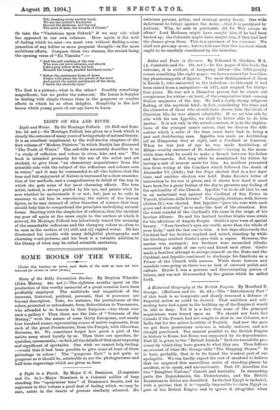C URRENT LITERAT URE.
MR. ST. JOHN LUCAS'S POEMS.
Poems. By St. John Lucas. (A. Constable and Co. 5s. net.) —Mr. Lucas overlays his thought, of which he has at least a more than passable supply, with an excess of ornamentation. His language is sometimes lurid, sometimes gorgeous, but both the gloom and the brilliancy are commonly in excess. We tal,:e "The Dream of Youth" as an example. Here is a stanza in which he describes the glories of "the saffron-vestured virgin dawn" :- "And all dark hills and all the slate-hued seas Borrowed their Heaven of colour from her eyes ; Her bondiess air lent incense to the breeze And streamed in splendour up the thrilling skies ; Her bosom taught the never-dwindling snows Their mystic white and rose."
And here, again, is a picture in a very different tone :—
" ' The huge fish-lizards died in blood-stained seas, And horned white snakes that lurk in sunless dens Battled with horrid hissing ; for on these
My sacred ardour fell ; the denizens Of sunken isle and crumbled continent Were slaves that Nature lent
To me her master-craftsman ; all dread things I owned, and dark abortions of night's womb. The blood-gorged vampires furling leathern wings In foul recesses of an ancient tomb
I lured to light.'"
This is not mere random work ; that is evident to any one who studies it carefully. But it is not the best type of poetic diction. We are reminded of the florid compound epithets of early Latin poetry which gave place to a language more austere but more strong. Mr. Lucas, indeed, supplies us with contrasts to himself. Let the reader turn, for instance, to the elegy "In Memoriam, W. B. L. A." How simple it is, how austere and how strong !— " 0 valiant heart, all pulseless now, 0 sightless eyes, once lit with mirth ; 0 strong young limbs, 0 radiant brow All forfeit to the cruel earth, 0 lips that laughed, 0 brain that schemed ; 0 pallid cheeks we may not kiss, 0 sunlit soul that soared and dreamed, Were you all perfected for this,—
To sob your life out slowly, slain By the chance bullet of some foe Unseen, nor yet to conquer pain By striking one last desperate blow We may not read the secret rune That shrouds the law of life and death ; The world is but a broken tune, A snatch of melody, a breath Of song appearing harsh to ears Which only catch the opening phrase ; But we shall hear the rhythmic spheres. And tread at last the warded ways; We see the soldier's Eucharist Beyond the darkness, and beyond The scars of men, the wounds of Christ."
Or take the "Variations upon Oxford," if we may cite what has appeared in our own columns. Here again is the note of feeling which we miss—we must own without finding a com- pensation of any loftier or more pregnant thought—in the more ambitions efforts. Compare these two stanzas, the second being the opening verse of "Ex Vinculis " :—
"And the soft rustling of the vole Who sees our prow advance, and shoots Like a grey arrow down his hole Beneath the tough, gnarled hawthorn roots."
"Before the opalescent dome of dawn
Flakes with green lire the jewels of the lawn And paints the purple parchment of the skies, I watch thy shadowy eyes."
The first is a picture; what is the other? Possibly something magnificent; but we prefer the water-rat. Mr. Lucas is happier in dealing with simple themes than in the gorgeous or sombre effects in which he so often delights. Simplicity is the last lesson which young poets of our age have to learn.



































 Previous page
Previous page